2010 山东省滨州市中考英语真题及答案
第 I 卷(选择题 共 106 分)
一、听力选择(共 20 小题, 计 30 分。每小题约有 8 秒钟的答题时间。)
(一)录音中有五个句子, 听句子两遍后, 从每小题 A、B、C 三个选项中选出能对每个句子
做出适当反应的答语。
1. A. Yes, I am.
B. No, I can't.
C. Yes, I do.
2. A. You are welcome.
B. It doesn't matter.
C. Sure, it's over
there.
3. A. Four kilos.
B. Three dollars.
C. Five hours.
4. A. Much better.
B. Never mind.
C. Sorry to hear that.
5. A. I can play the guitar.
B. I like country music.
C.
My
favorite singer is Jack.
(二)录音中有五组对话和五个问题, 听对话和问题两遍后, 从每小题 A、B、C 三个选项中
选出能回答所给问题的正确答案,
6. Where did Tom go on vacation?
A
B
C
7. How often does Eric go swimming?
A. Once a month.
B. Every day.
C. Once a week.
8. Why doesn't John look well today?
A. Because he didn't pass the test yesterday.
B. Because he didn't have a good rest last night.
C. Because he had a terrible headache last night.
9. What does Andrew want to be now?
A
B
C
10. Where will they meet?
A. In the classroom.
B. Outside the school gate.
C. At home.
�
(三)录音中有一段对话和五个问题, 听对话和问题两遍后, 从每小题 AB、C 三个选项中选
出能回答所给问题的正确答案。
11. Who comes from America?
A. Lucy.
B. Steve.
C. Jeff
12. What does Jill think of Steve?
A. He is friendly.
B. He is helpful.
C.
He
is
outgoing.
13. What does Jeff look like?
A
B
C
14. What club is Jeff in?
A. The soccer club.
B. the basketball club.
C.
The
ping-pong club.
15. When can Mary meet Jill's friends?
A. Tomorrow.
B. Next term.
C. This Sunday.
(四)录音中有一篇短文和五个问题, 听短文和问题两遍后, 从每小题 A、B、C 三个选项中
选出能回答所给问题的正确答案。
16. What was the weather like?
A. Sunny.
B. Windy.
C. Cloudy.
17. Who waited for the bus with Dale?
A. His mother.
B. His grandma.
C. His grandpa.
18. Where was Dale going?
A. To a piano club.
B. To the next stop.
C.
To
school.
19. What time did the bus come at last?
A. At 7:15a. m.
B. At 7:20 a.m.
C. At 7:30 a. m.
20. Which of the following is TRUE?
A. Dale was singing happily at 7:15.
B. It's far from Dale's home to school.
C. There is a piano by the side of the road.
二、选择填空(共 15 小题, 计 15 分
从 A、B、C、D 四个选项中, 选出可以填入空白处的最佳答案。
�
21. —Have you ever seen _________film Ne Zha?
—Yes, I have. It tells us ____________different story of Ne Zha.
A. a; an
B. an; the
C. a; the
D. the; a
22. —Where did you buy that beautiful hat, from a shop or a supermarket?
— ____________. I am used to shopping online.
A. Neither
B. Either
C. Both
D. None
23. —I like the number"9"best, because I think it stands for "long lasting".
— Me too. So I choose _____________ floor to live on.
A. nine
B. ninth
C. the nine
D. the ninth
24. —It's very important for us to keep _____________.
—You are right. We should learn how to protect ourselves when we're in trouble.
A. rapid
B. safe
C. lucky
D. social
25. —Could you tell me why you learn English so well?
—It's very simple. _____you study, __________ grades you will get.
A. The harder; better
C. Harder; better
B. The harder; the better
D. Harder; the better
26. —I think washing hands every day is good_____________ our health.
—Yes, I agree___!
A. to; to
B. with ;to
C. for; with
D. at; with
27. —Mum, must I be a teacher like you when I grow up.
—No, you needn't. You can make your own _______________.
A. difference
B. discussion
C. discovery
D. decision
28. —I think I am the shyest in my class. What should I do?
— Be more active in class, ________ you can improve your ability to express
yourself.
A. so that
B. unless
C. or
D. although
29. —Will you go to Lisa's housewarming party next Sunday?
—Well, if I__________, I will go on time.
A. invite
invited
B. will invite
C. am invited
D. will be
30. —Tom, it smells so terrible here.
— Sorry, mum. I will ____________my socks and wash them right away.
A. put off
B. take off
C. turn off
D. cut off
31. —On my way to the bookstore, I saw Mary hanging out with her friends.
—It ____________be her. She has gone to Beijing.
A. can't
B. mustn't
C. might
D. could
�
32. —The little boy is only three years old, but he can memorize about 50 poems.
—___________talented boy he is!
A. How
B. How a
C. What a
D. What
33. —Do you know Li Ziqi?
—Of course. She is a beautiful girl _________ has made many videos to show a
traditional Chinese way of life.
A. whose
B. where
C. which
D. who
34. —Mr. Wang, can I go to play football with my classmates as soon as school is
over?
—____________We have to prepare for the coming Art Festival together.
A. Why not?
B. I hope so.
C. I'm afraid not.
D. Of course.
35. —What will you remember most after leaving junior high school?
—I will always remember___________________.
A. how my friends and teachers used to help me
B. when did my friends and teachers arrive
C. where could my friends and teachers meet
D. what did the teachers say to me
三、完形填空(共 10 小题, 计 10 分)
阅读下面短文, 从每题所给的 A、B、C、D 四个选项中, 选出一个能填入文中相应空白处的
最佳答案。
Once there lived a wise man. His son, however, was very lazy amnd did nothing
all day. The wise man was
36
about his son's future. One day, he said to his
son, "I want you to find some
37
. I have drawn a map to guide you/Then he handed
his son a bag. Inside the bag were clothes, some food, a little money and the map.
The son
38
the next day. He had to travel across forests, rivers and
mountains.
Along the way, he was helped by some with food and by some with rooms to live
in. He came across robbers(强盗)who tried to rob him. He also saw changing scenery
(风景)and seasons. __39
, after a long year, he got to the place his father said.
He
40
two days looking and digging for the treasure, but found
41
.
So he had to head back
42
his home. On the way, he experienced the same
scenery. Sometimes, he would stop to enjoy the beauty of nature. He also learned
to make meals. He even had to fix his clothes
43
. He was now able to tell time
by the position of the sun. He met the same people who had helped him
44
. This
time, he stayed and helped them in order to repay them.
When he got home, he said
45
to his father for not finding the treasure.
�
"There wasn't any treasure h the very first place, my son, "the father answered
with a smile. "But I think you have found your life's true purpose. "
36. A. surprised
B. relaxed
C. excited
D. worried
37. A food
B. clothes
C. treasure
D. maps
38. A. sold out
B. set out
C. gave out
D. cut out
39. A. Finally
B. Mostly
C. Normally
D. Especially
40. A. cost
B. took
C. paid
D. spent
41. A. something
B. anything
C. everything
D.
nothing
42. A. to
B. from
C. in
D. at
43. A. herself
B. himself
C. itself
D.
themselves
44. A. later
45. A. sorry
B. earlier
C. sooner
D. elder
B. congratulations
C. advice
D. pleasure
四、阅读理解(共 20 小题, 计 40 分)
阅读下面短文, 从每题所给的 A、B、C、D 四个选项中, 选出能正确回答所提问题或完成所
给句子的最佳答案。
A
Animals are our friends. Sometimes they make trouble, but sometimes they can
help us. And they hope to live a happy life, too. Here are two real stories from
our readers.
The first story is from Ray. "My cat, Tiger, hates it when I use my iPad because
it takes my attention away from him. One year, I had a fall at home and was on the
floor for 16 hours. During this time, I was unable to move and couldn't get to the
phone to call for help. Tiger stayed by my side until he disappeared under my bed.
'What's he pup to?' I wondered. To my surprise, he started to push something towards
me. It was my iPad, which I didn't realize had fallen off the bed and onto the floor.
He probably didn't know what it was, but he knew that it made me happy. Thanks to
Tiger, I was able to communicate with my friend, Becky, who then told my doctor.
"
The second story is from Colin. "Years ago, my friend Julius saved a bird—
a wild 'Mom' cockatoo(鹦鹉)from the side of the road and kept it as a pet in a
big cage(笼子). It lost one of her wings, so she was unable to return to the wild.
Soon, two wild cockatoos came visiting and one 'Dad' bird wanted to find his way
into the cage. The 'Mom' cockatoo in the cage was soon expecting. But as she couldn't
fly, 'Dad' cockatoo built a home in the tree, keeping off everyone who got close
�
to 'Mom' cockatoo. 'Baby' cockatoo would spend his days flying off with his dad,
leaving his mom behind. She would sit and wait until they returned home each
afternoon. The family stayed together happily. "
After reading the stories, don’t you think we should get along well with animals?
No matter they are our pets or live in the wild, they have their feelings. We should
respect every life in the world.
46. ____________ is the owner of the cat.
A. Becky
B. Julius
C. Colin
D. Ray
47. The underlined word "it" in Paragraph 2 refers to the_____________.
A. phone
B. cat
C. iPad
D. bed
48. "Mon" cockatoo didn't return to the wild because ____________________.
A Julius caught it as a pet
B. she vas badly hurt and couldn't fly
C. she preferred the life in the cage
D. "Dad" cockatoo built a home in
the tree
49. The main idea of the passage is that _____________.
A. Ray, Becky and Colin are animal lovers
B. we shouldn't use iPad too much
C. friends should help each other
D. we should respect every life
in the world
50. In which part of a newspaper would you probably read the passage?
A. Sports news.
B. People and animals.
C. Health.
D. Travel.
B
How to fight against COVID-19(新冠病毒)?We choose some books to help you. The
books were translated into 13 languages, including Japanese, French and Russian.
They are convenient for readers to enjoy.
Virus, Virus, You Cannot Scare Me! (Writer: Mu Xiangzhen)
The book makes parents and children be able to learn
—in a fun way—about how viruses(病毒)spread and what people
can do to protect themselves. It tells children not to fear
about viruses. Besides, it also introduces the idea of getting
well with nature, and hopes children can protect wild life and
the natural environment.
�
A Special Spring Festival (Writer: Gao Jing)
This book pictures children's special Spring Festival in
China during the outbreak of COVID-19. It tells a story of a
common family in China. It tries to answer the child/s question
"Why can't I be allowed to play outside?" It tells the child
what COVID-19 is, how it spreads, and how we can protect
ourselves from it. The pictures show love between family
members, friends and everyone.
Ten Tips to Fight Monsters (Writer: Dong Ruihan)
Dad leaves 10 tips to help us fight the virus. Who will win
the war? The story will gently teach children how to prevent
the disease ( 疾 病 )in a language that they can easily
understand. It will help kids remain calm in the hard time, and
encourage them to help family members to prevent the disease.
A Brief History of Viruses for Children
(Writer:ChangshaWhite-flagDolphinChildren'sBookWorkshop)
This storybook tells the beginning of the virus, so the
readers can understand the history of the virus easily. The book
sets up a "Ten Questions about COVID-19" section, which
explains the knowledge of COVID-19(including how it spreads),
helping children readers to understand the virus basing on (基
于)reason and science.
51. All the four books are about ________________.
A. children's daily activities
B. ten questions about COVID-19
C. fighting against COVID-19
D. love between family members, friends and everyone
52. If you want to know the beginning of the virus, you can read ____________.
A. Virus, Virus, You Cannot Scare Me!
B. A Special Spring Festival.
C. Ten Tips to Fight Monsters.
D. A Brief History of Viruses for Children.
53. Which writer hopes children can protect wild life?
A. Mu Xiangzhen.
B. Gao Jing.
C. Dong Ruihan.
�
D. Changsha Whiteflag Dolphin Children's Book Workshop.
54. The spread of the virus is mentioned in __________________.
①Virus, Virus, You Cannot Scare Me! ②A Special Spring Festival
③Ten Tips to Fight Monsters
④ A Brief History of Viruses for Children
A. ①②③
B. ①②④
C. ①③④
D. ②③④
55. According to the passage, which one is NOT true?
A. The books were translated into many languages.
B. Children can do something to protect themselves.
C. We can understand the virus basing on reason and science.
D. We have won the war against COVID-19 completely.
C
In 1972, Richard Sears, a young American began
learning Chinese because of his interest in traditional
Chinese culture.
Drawn to the ancient language, he went to China to
study Chinese in the 1990s.
In 1994, Richard Sears decided to put the ancient Chinese characters online.
Then, in 2002, he did it That is the beginning of the Chinese Etymology(汉字字
源)website. "My website did not get much attention for the next few years. Until
one day in 2011, it suddenly got a lot of attention.
I got a few thousand emails, and a few million visitors and people started
calling me 'Uncle Hanzi', " Sears said with a smile. Hanzi means Chinese characters.
He has put more than 96, 000 ancient Chinese characters onto the website. "When
I study each character, I wonder what the ancient Chinese thought, " said Sears.
After visiting many Chinese cities, Sears learned more about China and ancient
Chinese culture, He said when he came to China in the last century, few Chinese
could speak good English "However, you can hear English in many places in China
now. Chinese language and culture were mysterious and not known by people in most
countries then, but now, more and more people in the world are learning Chinese,
even Chinese history, traditional Chinese medicine and so on, "Sears added.
At present, the 70-year-old American has made his home in China. "When I die,
I hope my website will live on, and I'm planning to write a book about my research.
This will be my gift to China, " he said.
56. What does "Drawn to the ancient language" mean in Paragraph1?
A. Sears was interested in ancient Chinese.
B. Sears had to study Chinese characters.
�
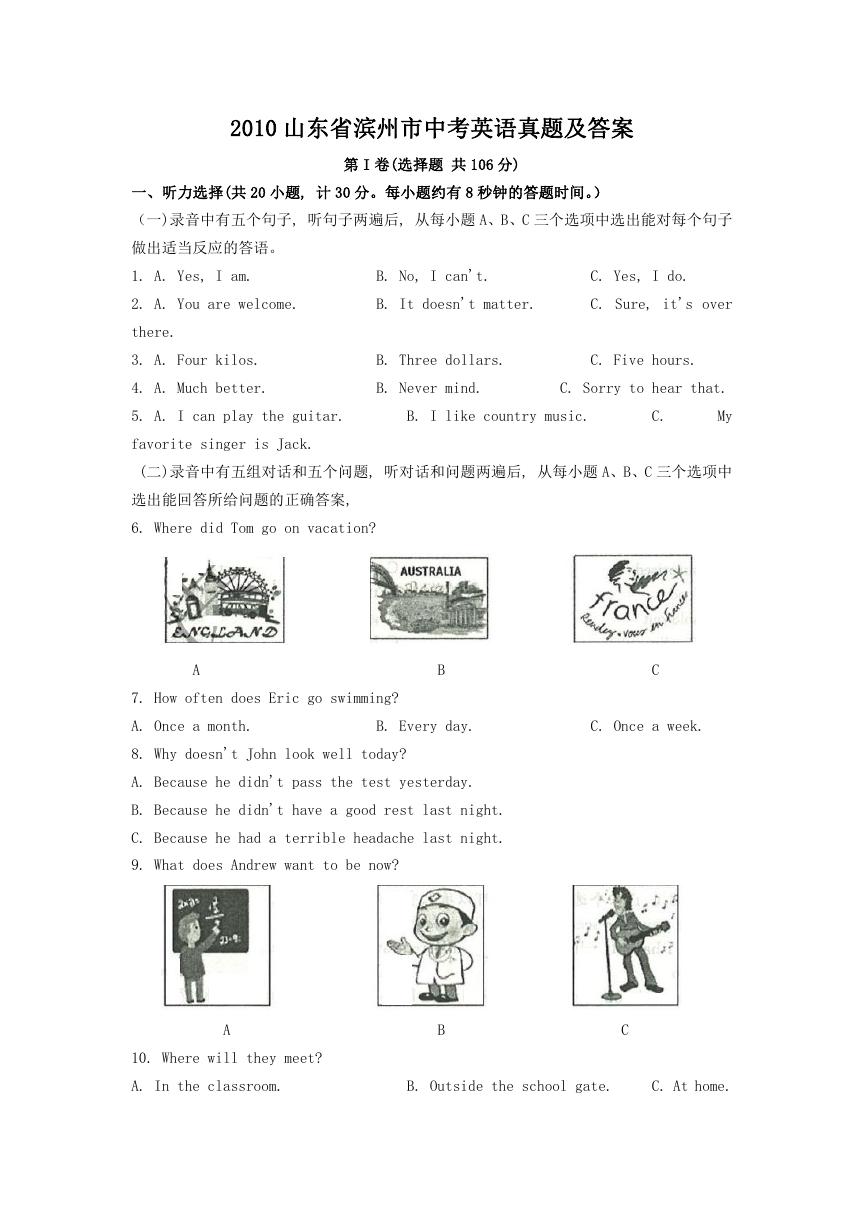
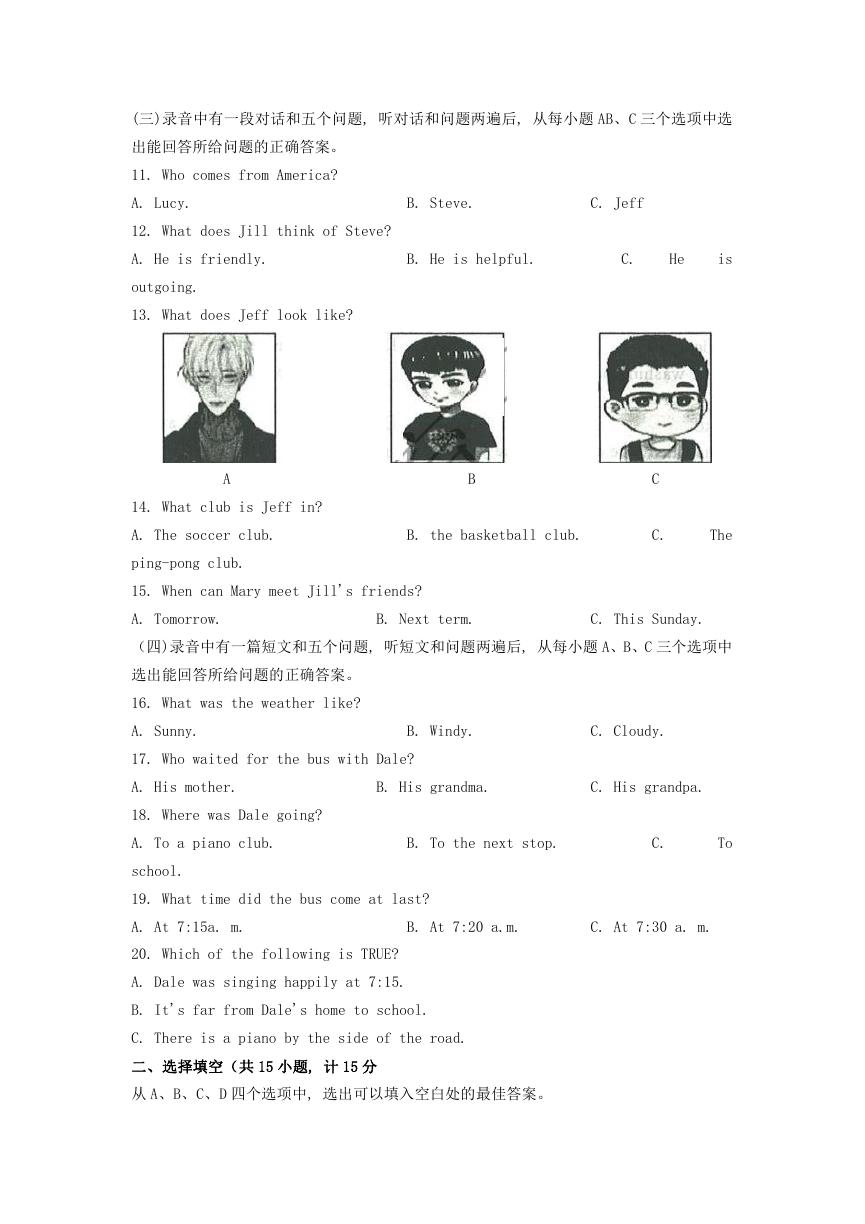
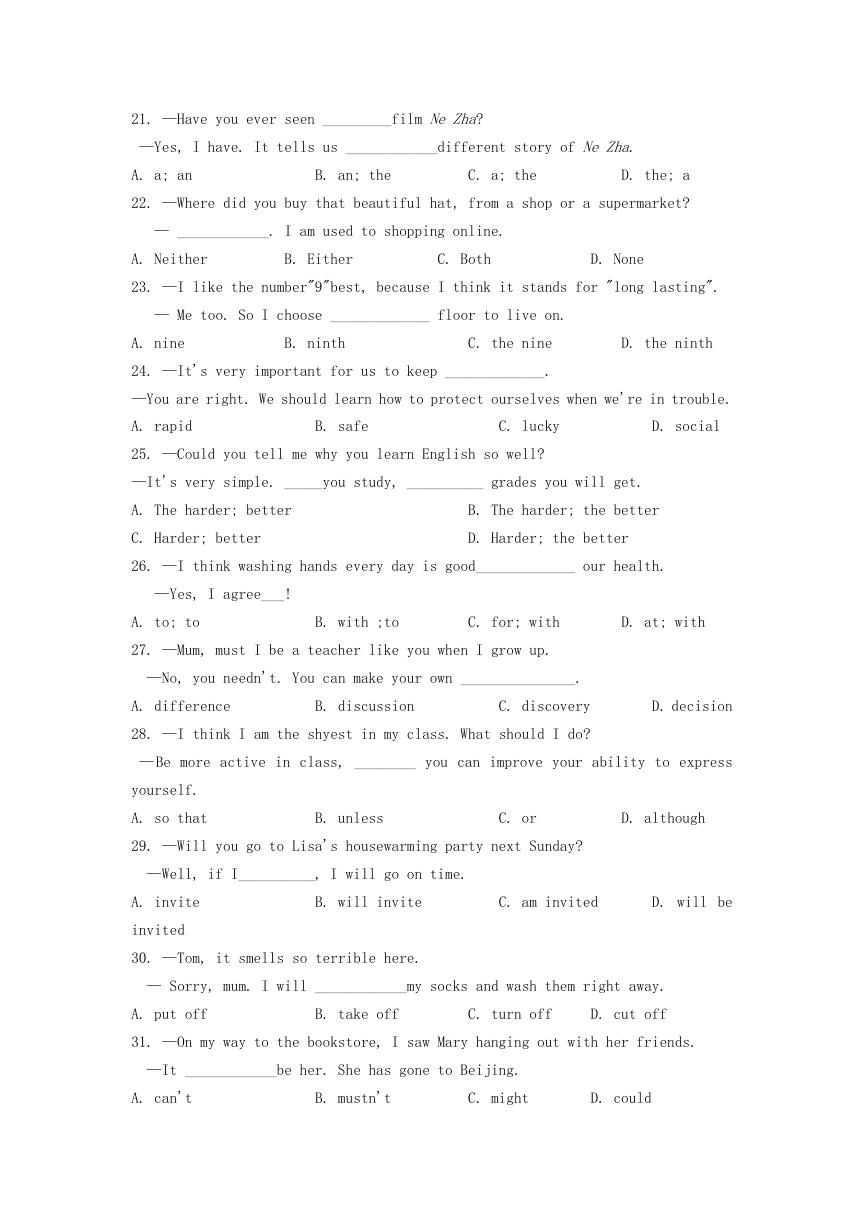
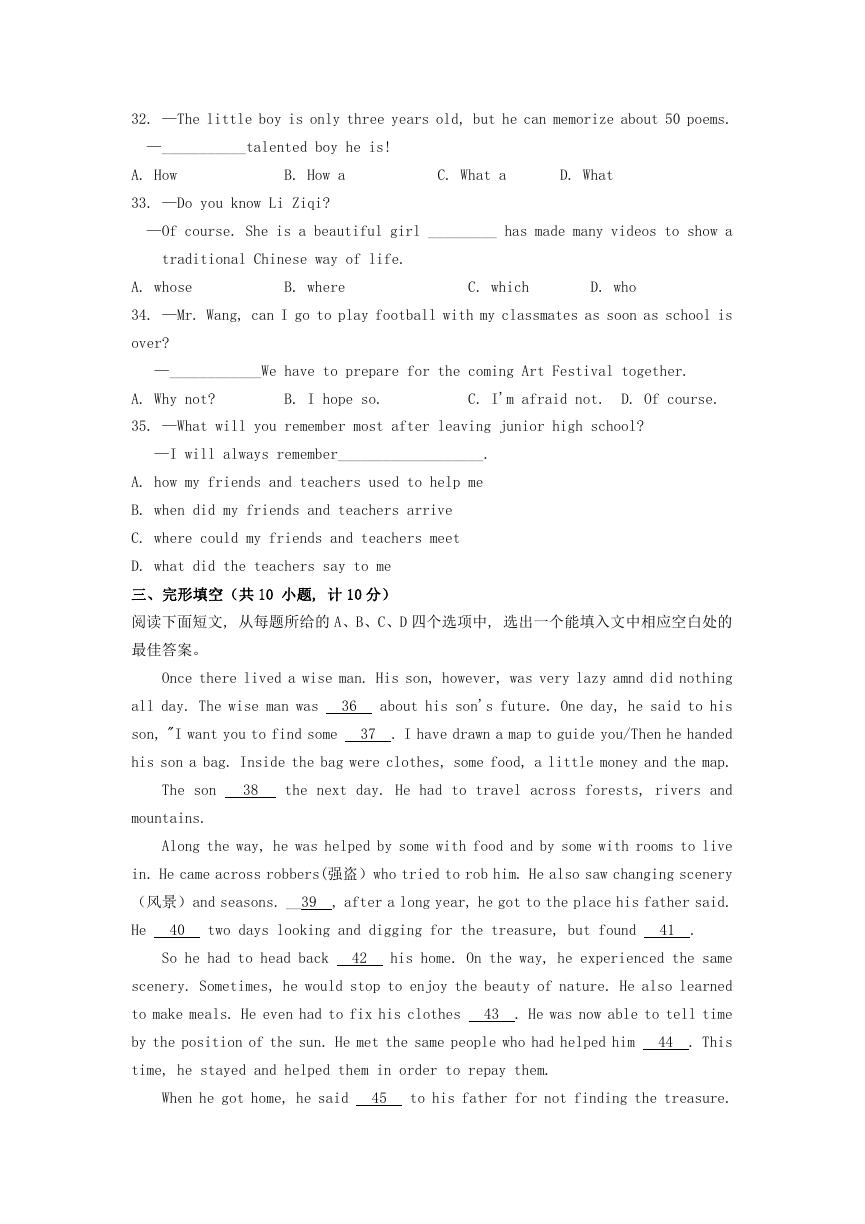
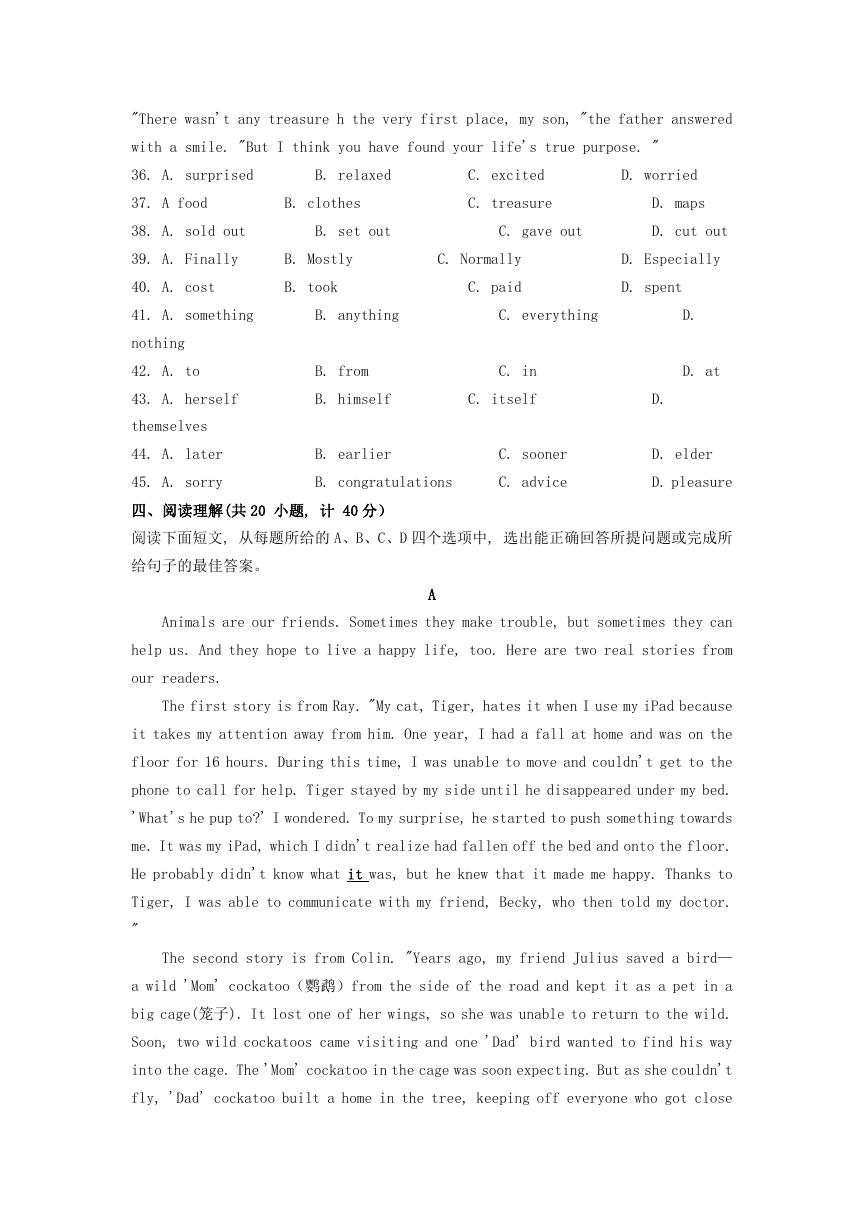
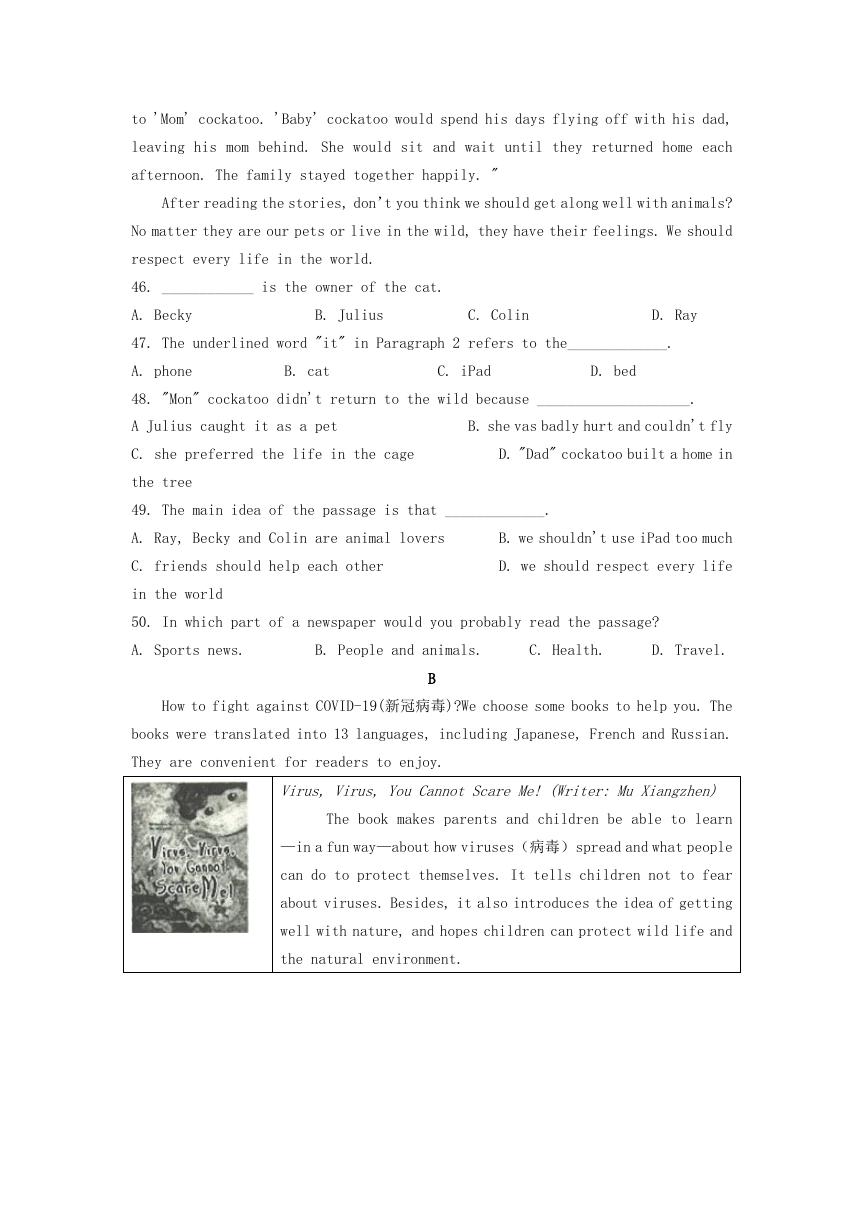
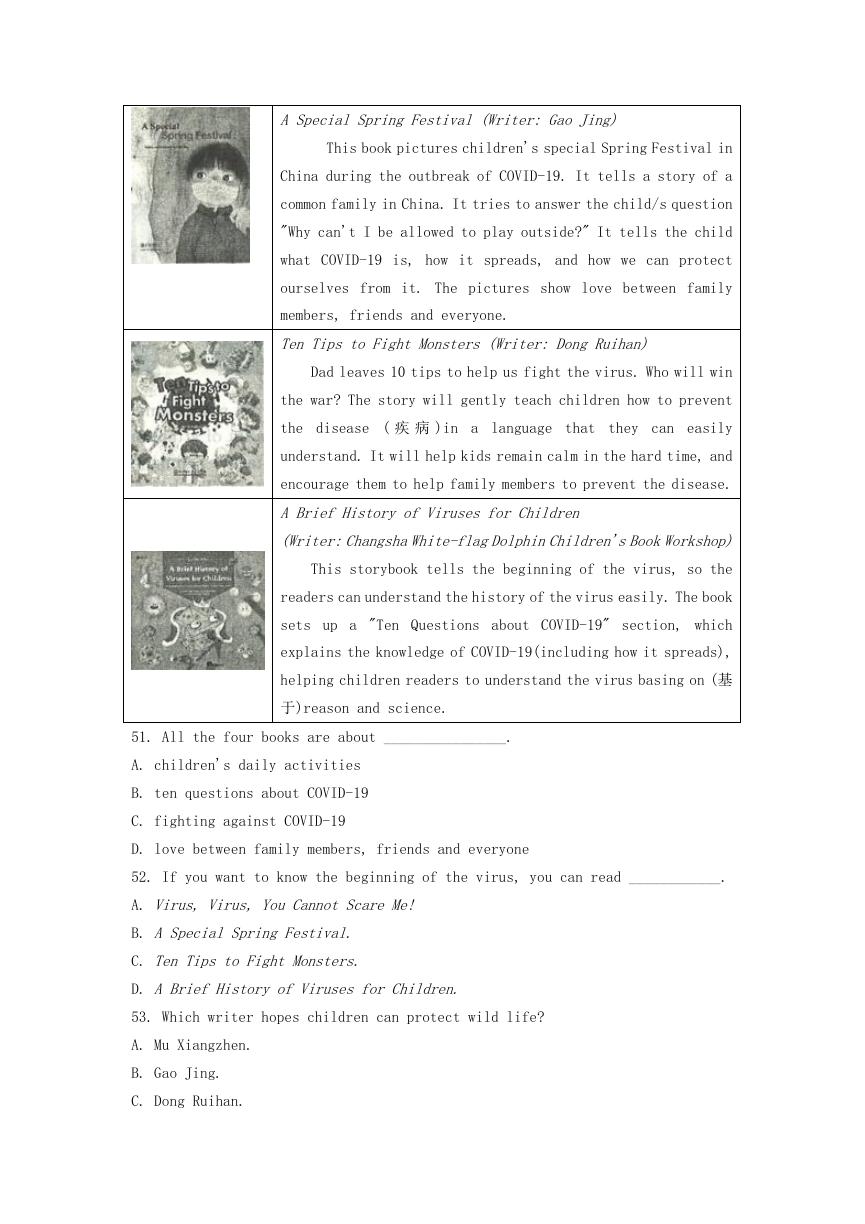
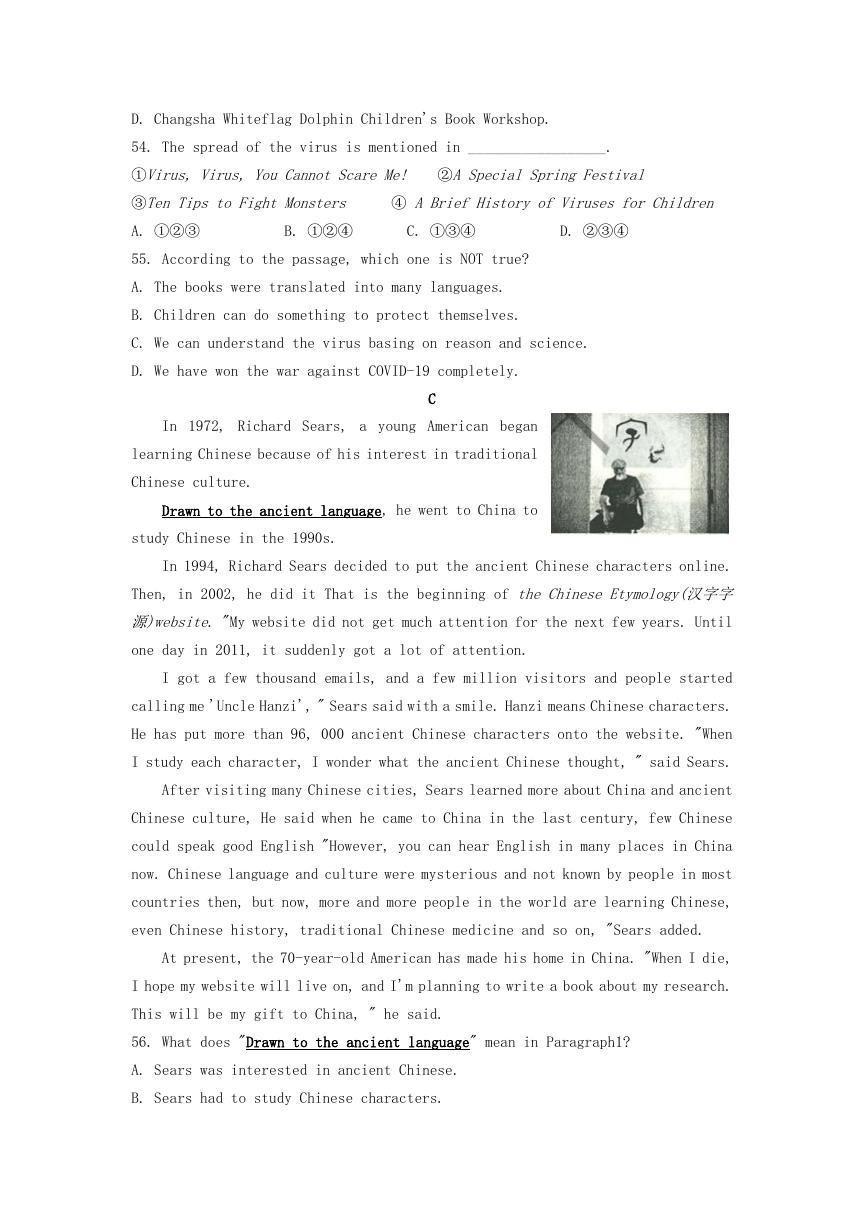








 2023年江西萍乡中考道德与法治真题及答案.doc
2023年江西萍乡中考道德与法治真题及答案.doc 2012年重庆南川中考生物真题及答案.doc
2012年重庆南川中考生物真题及答案.doc 2013年江西师范大学地理学综合及文艺理论基础考研真题.doc
2013年江西师范大学地理学综合及文艺理论基础考研真题.doc 2020年四川甘孜小升初语文真题及答案I卷.doc
2020年四川甘孜小升初语文真题及答案I卷.doc 2020年注册岩土工程师专业基础考试真题及答案.doc
2020年注册岩土工程师专业基础考试真题及答案.doc 2023-2024学年福建省厦门市九年级上学期数学月考试题及答案.doc
2023-2024学年福建省厦门市九年级上学期数学月考试题及答案.doc 2021-2022学年辽宁省沈阳市大东区九年级上学期语文期末试题及答案.doc
2021-2022学年辽宁省沈阳市大东区九年级上学期语文期末试题及答案.doc 2022-2023学年北京东城区初三第一学期物理期末试卷及答案.doc
2022-2023学年北京东城区初三第一学期物理期末试卷及答案.doc 2018上半年江西教师资格初中地理学科知识与教学能力真题及答案.doc
2018上半年江西教师资格初中地理学科知识与教学能力真题及答案.doc 2012年河北国家公务员申论考试真题及答案-省级.doc
2012年河北国家公务员申论考试真题及答案-省级.doc 2020-2021学年江苏省扬州市江都区邵樊片九年级上学期数学第一次质量检测试题及答案.doc
2020-2021学年江苏省扬州市江都区邵樊片九年级上学期数学第一次质量检测试题及答案.doc 2022下半年黑龙江教师资格证中学综合素质真题及答案.doc
2022下半年黑龙江教师资格证中学综合素质真题及答案.doc